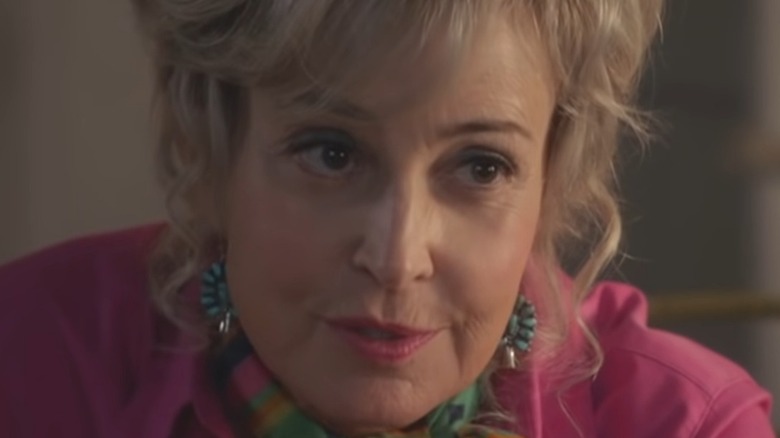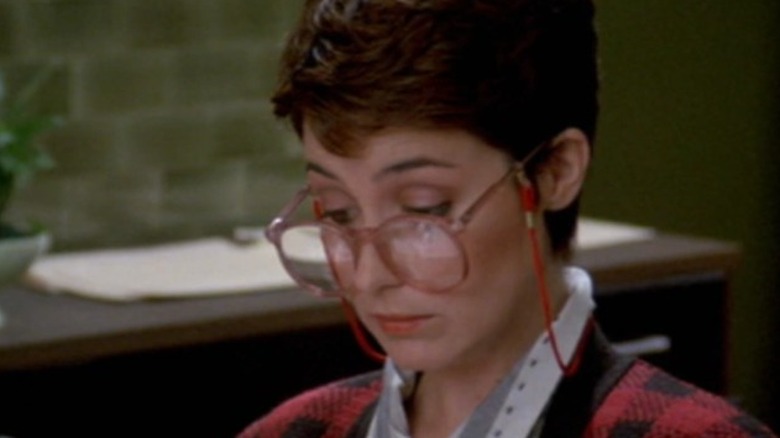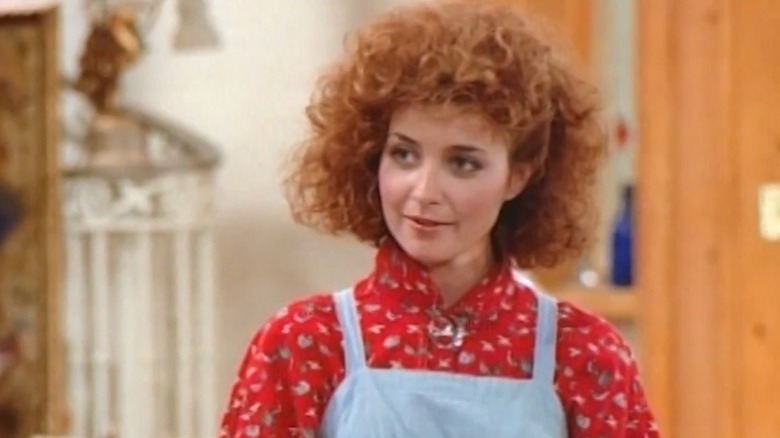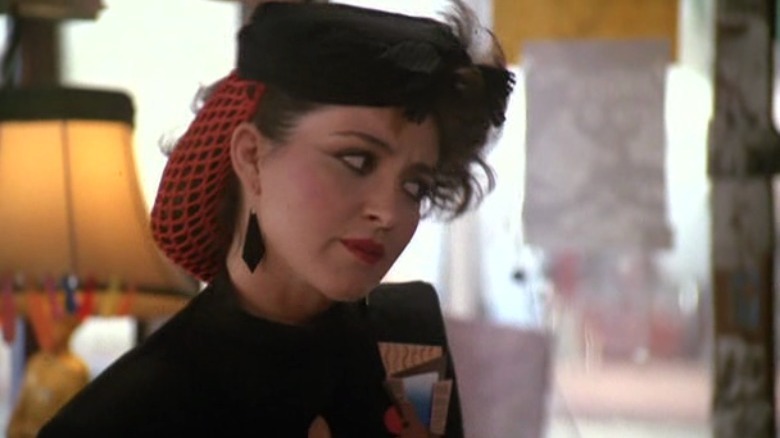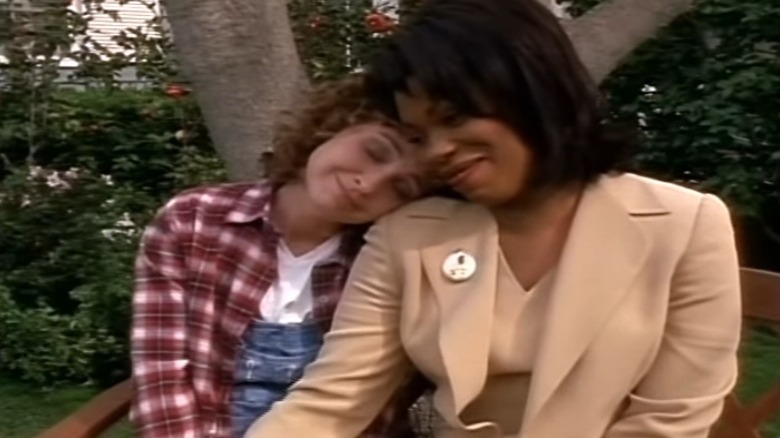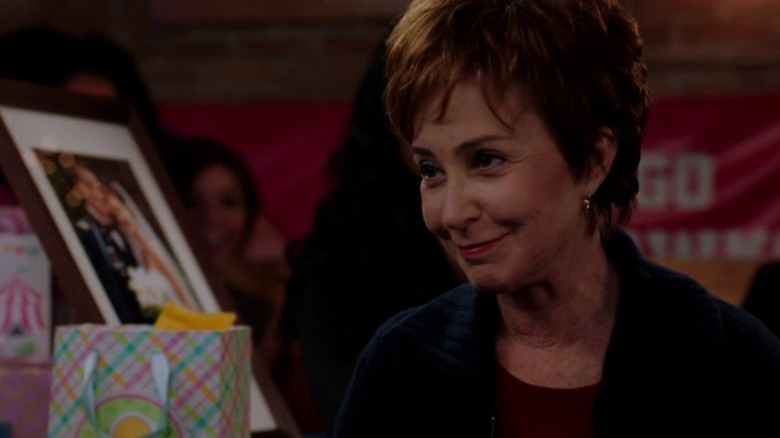Why Meemaw In Young Sheldon Looks So Familiar
Created by Chuck Lorre and Steven Molaro, CBS' "Young Sheldon" is not just one of the most successful sitcom spin-offs to have hit American TV screens in decades, but one of the most popular shows currently running, period. Its exploration of unconventional, fraught, yet recognizably loving and tight-knit family dynamics in late-20th-century Texas has made for some of network TV audiences' most cherished moments of both comedy and pathos in recent years, and the show has managed to win over even the hearts of critics, many of whom were skeptical at first about the prospects of a "The Big Bang Theory" offshoot focused on its most ubiquitous, memetic, and controversial figure.
A large part of the charm of "Young Sheldon" stems from the feeling of authenticity and familiarity mustered by its setting, the fictional East Texas town of Medford, and the people who populate it — right down to the nuclear family unit at the center of the story. And one particularly vital component of the show's winning alchemy is Sheldon Cooper's (Iain Armitage) maternal grandmother, Constance "Connie" Tucker, affectionately referred to by her grandchildren as "Meemaw." Brash and foul-mouthed, Connie is the Cooper household's resident snarker, as well as a fiercely devoted grandma. First introduced on a Season 9 episode of "The Big Bang Theory," on which she was played by June Squibb in a guest spot, the character is brought to life on "Young Sheldon" by a veteran actress accustomed to stealing the scene. Here's where you might have seen her before.
Annie Potts plays Janine Melnitz in the Ghostbusters franchise
When we think of the Ghostbusters, we usually think of the four men who officially make up the titular phantom-catching team — Peter Venkman, Ray Stantz, Egon Spengler, and Winston Zeddemore, respectively played by Bill Murray, Dan Aykroyd, Harold Ramis, and Ernie Hudson in the original 1984 film. But, from the very jump, there was a woman who was every bit as crucial to the success of the Ghostbusters enterprise as the guys. We're referring, of course, to Janine Melnitz, the team's hypercompetent secretary, receptionist, de-facto manager, and occasional fifth field agent.
Janine has been an important character in pretty much all "Ghostbusters"-related media, and, in each of her three film appearances, she has been portrayed by Annie Potts. A veteran of the screen and stage, Potts started acting in 1977 with roles in the TV movie "Black Market Baby" and the short-lived CBS sitcom "Busting Loose," and broke into cinemas with award-nominated performances (via IMDb) in "Corvette Summer" and "Heartaches." But it was "Ghostbusters" that really introduced her to a wide audience; her performance as the ensemble everywoman was note-perfect, and provided a highly effective comedic foil to the madcap energy of the film's star comics, with her exaggerated Brooklyn accent playing a crucial part in the loving New York City ribbing for which "Ghostbusters" became notable.
It was only the first of what would become a litany of iconic roles for Potts, on big and small screens alike.
She made TV history as Designing Women's Mary Jo Shively
The mid-to-late '80s birthed some of the most legendary and fondly-remembered comedy series of all time, from "Seinfeld" to "The Wonder Years" to "The Simpsons" to "The Golden Girls" to "Moonlighting" to "Murphy Brown." It was a particularly fertile time for an envelope-pushing workplace sitcom with a female ensemble to flourish — and that's just what CBS' "Designing Women" was.
Created by Linda Bloodworth-Thomason, "Designing Women" was set in Atlanta, Georgia, and focused on the women of Sugarbaker & Associates, an interior design firm run out of the home of co-founder and effective series protagonist Julia Sugarbaker (Dixie Carter). Annie Potts, fresh off her "Ghostbusters" success, starred on the show for all seven seasons as Mary Jo Shively, Julia's best friend and next-door neighbor, who served as the leading interior designer at Sugarbaker & Associates.
A recent divorcee at the start of the series, Mary Jo is the brain of the team, and often has trouble keeping her sharp wit and proclivity for dry rejoinders from causing trouble with acquaintances — and even clients, on some occasions. True to the series' ethos of exploring the complexities and realities in the lives of the growing American female workforce, Mary Jo also dealt with the challenges of raising two kids on her own and had plots centered around hot-button issues like cosmetic surgery, workplace sexual harassment, artificial insemination, beauty standards, high school sex ed, and the pitfalls of the adult dating world.
She stole the show as Iona in Pretty in Pink
The glut of American teen dramedies of the '80s and early '90s is perhaps best-remembered for some of the more, shall we say, writerly qualities of those films — the authenticity of the rapport between the characters, the relatability of their personal conflicts, the soothing and comforting dramaturgical ring there was to following their journeys and being in their company. But '80s teen movies were also largely considered exercises in style, and one can argue that no movie demonstrates that more aptly than 1986's "Pretty in Pink."
Directed by Howard Deutch from a screenplay by John Hughes and starring generational icon and Brat Pack mainstay Molly Ringwald, "Pretty in Pink" is as remembered for its tale of a high school senior caught in a love triangle as it is for its stylistic elements — most notably the legendary soundtrack, and Marilyn Vance's lush, aspirational costume design. Both of those elements coalesced via the character of Iona, the manager of the record store where protagonist Andie Walsh (Ringwald) works part-time. A veritable style icon who rocked some of the most memorable onscreen fits of the decade, Iona also fulfills the role of Andie's wise, clear-eyed mentor and confidante, who helps her navigate all the earth-shattering crises of senior year in her own scene-stealing way.
She led Any Day Now alongside Lorraine Toussaint for four seasons
It didn't take long after "Designing Women" for Annie Potts to find regular work again, as she nabbed a leading role in the latter two seasons of the CBS romantic sitcom "Love & War." The following years also saw her join the fold of the "Toy Story" franchise in the role of Bo Peep, which she reprised two decades later when the character made her triumphant return in 2019's "Toy Story 4." But the real noteworthy Annie Potts role of the '90s was that of Mary Elizabeth "M.E." Sims, on the groundbreaking Lifetime drama "Any Day Now."
Although Lifetime was and remains known primarily for its over-the-top TV movies, it made a huge gamble for the sake of art when it gave the go-ahead to Nancy Miller and Deborah Joy LeVine's vision of a no-holds-barred show about racial strife in contemporary America (via Vice). Following childhood best friends M.E., a housewife and aspiring writer, and Rene Jackson (Lorraine Toussaint), a successful lawyer, as they reconnect after decades apart, "Any Day Now" flashed back to the two women's time growing up together in 1960s Alabama to draw parallels between the realities of racism then and now, with a degree of frankness, depth, and historical clarity that still puts most media about "white-Black friendship" to shame. And, all the while, both Potts and Toussaint got to sink their teeth into vividly-rendered, multidimensional characters, earning acclaim and awards (via IMDb) for their troubles.
She guest-starred on Chicago Med as Natalie's mother-in-law Helen
As one of American TV's top-rated and longest-running dramas on air, "Chicago Med" has managed to endear its cast of characters to audiences across the country like few other shows, to the point where eventual cast departures — inevitable on any series that lasts for as long as this one has — invariably sting badly. This has been especially true of Dr. Natalie Manning (Torrey DeVitto), who left the show on the first episode of Season 7.
Before the end of her "Chicago Med" tenure, Natalie was prominent enough on the show to have her family life and past figure prominently in episodes, especially her history with her late husband Jeff, who she had just recently lost when the show's story begins. Although Jeff's absence was felt deeply by Natalie, she could still count on the support and understanding of her mother-in-law Helen, who was played by Annie Potts on a total of five Season 1 guest spots.
As a mother going through her own grief process, Helen did what she could so she and Natalie could cope with the reality of their loss, and with what it meant for Natalie's family life going forward, together. Of course, she was only human and she made some questionable decisions over the course of Season 1, fueled by her complicated feelings of attachment to the memory of her son and to her grandson Owen (Ari Morgan). But Potts always made sure Helen felt human and multi-dimensional.
